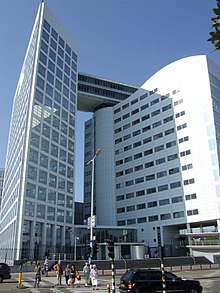The International Criminal Court (ICC) is a permanent international tribunal seated at The Hague which was created by the multilateral treaty known as the Rome Statute. The Rome Statute was adopted on July 17, 1998, and came into effect on July 1, 2002, after domestic ratification by sixty State Parties. The ICC was created to prosecute the most serious international crimes. Its mandate includes genocide, crimes against humanity, and war crimes. The crime of aggression was added by a subsequent review conference in Kampala, Uganda, in 2010.
While the ICC has the power to hear cases within its mandate, it operates on the principle of complementarity and will only exercise its jurisdiction if national courts with jurisdiction either cannot or will not prosecute perpetrators of international crimes. The ICC may exercise jurisdiction if an accused is a national of a State Party (or if the State otherwise accepts jurisdiction), if a relevant crime occurs in the territory of a State Party, or if a situation giving rise to crimes within the Court’s purview is referred by the U.N. Security Council pursuant to its Chapter VII authority under the UN Charter, even if the situation occurs in a state which is not a party to the Rome Statute. The Prosecutor has the power to initiate investigations proprio motu if information credibly alleging the commission of crimes within the Court’s jurisdiction is received from individuals or organizations. Jurisdiction is also limited to crimes occurring after July 1, 2002, or after the relevant state ratifies the Rome Statute, whichever is later.
To date, the Court has had four situations referred to it via State Parties, by Uganda, the Democratic Republic of the Congo, the Central African Republic, and Mali. The U.N. Security Council has referred the situation in the Darfur region of Sudan and the situation in Libya. Neither are State Parties. The Prosecutor has initiated investigations into the situation in Kenya and the situation in Côte d’Ivoire.
The situation in Democratic Republic of the Congo was referred to the International Criminal Court in April of 2004 by Congolese President Joseph Kabila. The Prosecutor has charged six people with committing crimes within the jurisdiction of the Court in the Democratic Republic of the Congo: Thomas Lubanga Dyilo, Germain Katanga and Mathieu Ngudjolo Chui, Bosco Ntaganda, Callixte Mbarushimana, and Sylvestre Mudacumura. Each was charged with multiple counts of war crimes and crimes against humanity.
The trial of Thomas Lubanga Dyilo was the first to be completed before the ICC. Lubanga, who had been in custody in Kinshasa for murdering U.N. peacekeepers, was surrendered to the ICC on March 17, 2006, after an arrest warrant was issued in February of 2006. Following a tumultuous trial, Lubanga was convicted on March 14, 2012, of conscripting and using child soldiers in the hostilities for the Patriotic Force for the Liberation of Congo. He was sentenced to fourteen years in prison on July 10, 2012.
In jurisprudence, Lubanga is notable for its expansion of the law pertaining to child soldiers in armed conflict. Rulings confirm the longstanding doctrine of international human rights law regarding children that consent (i.e. enlistment versus compulsion) is irrelevant, and there is no need to show compulsion of the victim to prove the crime of conscripting or using child soldiers.
Germain Katanga, the alleged leader of the Front for Patriotic Resistance in Ituri, and Mathieu Ngudjolo Chui, the alleged leader of the Nationalist and Integrationist Front, were tried together. The trial began on November 24, 2009, and on December 18, 2012 Ngudjolo was acquitted of all charges. The prosecution appealed, but the verdict was upheld. Germain Katanga was convicted of being an accessory to crimes against humanity and war crimes on March 7, 2014. He was sentenced to 12 years imprisonment, with the seven years he spent in detention deducted from his sentence.
On June 9, 2014, Bosco Ntaganda, the alleged chief of staff of the Patriotic Forces for the Liberation of Congo (FPLC), was charged with war crimes and crimes against humanity for his involvement in two conflicts in Ituri in 2002 and 2003. The trial began on September 2, 2015, and on November 7, 2019 Ntaganda was sentenced to thirty years in prison. The six years he spent in detention were deducted from his sentence.
Mbarushimana was released from ICC custody after the Court declined to confirm the charges against him. The case will remain closed until the Prosecutor submits new evidence.
Sylvestre Mudacumura, the commander of the military wing of the Democratic Forces for the Liberation of Rwanda (FDLR), remains at large ever since his warrant was issued in July of 2012.
This page was written jointly by Christie Nicoson, Former Program and Operations Coordinator, Lisa Dailey, Former News Associate, and Rachel Hall Beecroft, Former Program and Operations Coordinator.
Last Updated, May 2020.
Other Resources
Report on the 12th Session of the Assembly of States Parties to the Rome Statute, Coalition for the International Criminal Court, 20-28 November 2013, The Hague, The Netherlands.
Obtaining Victim Status for Purposes of Participating at the International Criminal Court, American University, December 2013.
The Growing Importance of the International Criminal Court, by Naseem Kourosh, The Georgetown Journal, 27 January 2014.




